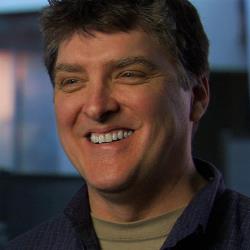
Composer Marty O’Donnell is set to speak at 8 p.m. on Sept. 17 in Weigel Auditorium.
Credit: Courtesy of the OSU School of Music
Ohio State’s School of Music and the Advanced Computing Center for Art and Design will host well-known composer and audio director Marty O’Donnell Wednesday in the Weigel Hall Auditorium for two events.
O’Donnell has composed music for a myriad of video games and TV commercials, including “Halo” and the Flintstones vitamins jingle. He has also collaborated with many big names, notably musician Paul McCartney and actor Peter Dinklage.
Timothy Leasure, associate director of the School of Music, said O’Donnell’s work is unorthodox and will provide students with a new perspective.
“The fields of entrepreneurship and video game music are still relatively new to the School of Music, and so we are trying to encourage our students to view music and their music careers more broadly,” he said.
During the events, O’Donnell will speak on his background, early career, collaborations and technological revolutions, as well as his interest in interactive entertainment, according to the School of Music’s website. Leasure said O’Donnell will also visit the School of Music and ACCAD classes.
The Lantern had a chance to speak with O’Donnell before Wednesday’s events and hear a little bit about him as a student, musician and composer.
The Lantern: You’ve been very successful in your own ventures, as well as collaborations with other artists, notably Paul McCartney. Can you pinpoint a time in your education that ended up being pivotal in the development of your career path?
Marty O’Donnell: Actually, I started out a piano performance major. I also had a band on the side that was playing progressive rock music, and I was writing music for the band. And in the first quarter of my junior year, I did a piano recital … and I wasn’t really excited about actually performing. And I realized, why am I a performance major if I don’t actually enjoy performing?
So I decided to switch majors. I went to the dean of the conservatory. He said, “Well he’s got a lot of work to make up,” so I had to take a bunch of classes to be able to qualify to get a composition degree. I would say that was the most pivotal moment.
TL: I think a lot of people here at OSU could relate to that — having a major, almost having it completed and then thinking to themselves, “What am I doing?” That sounds like it took a lot of guts. Were you scared? Or were you more excited?
MO: At the point I did it, I didn’t know if I was going to complete any kind of degree, because I didn’t think college, to me, was all that important at the time.
So, I thought, well I’ve got this band, maybe I’ll be a rock star and do albums, which was probably not the most realistic thinking in the world. So, to a certain extent, I was excited about making the change.
TL: You’ve spoken quite a bit for a variety of audiences. What piece of your story do you love sharing with audiences most?
MO: Well if I say it, I’ll give it away, but that’s OK.
When I got back from getting my master’s degree in composition … I thought I was going to teach at the American Conservatory of Music. But before that job actually started, I was working on a film set as a grip — the person who moves lights around and runs cable. And the producer of the thing I was working on, he came up to me and asked, “You know, Marty, you have a masters degree in music composition, why don’t you write music for commercials and film?”
And I looked at him, and I said, “Because I don’t want to prostitute my art.” And I said it in all seriousness.
The very next day, the director came up to me and he said, “Hey, Marty, I’ll give you $500 to write music from this thing we’re doing.” And I said “Absolutely.”
I mean, I didn’t even think twice about it. And I pretty much realized that you don’t really let people prostitute your art until someone offers you money.
TL: If you could’ve been the composer for any game released since 2000, what game would you have been the composer for?
MO: There’s probably two that I would’ve loved to have been able to work on because I actually just think they’re really great games.
One would have been “Ico”…and the other one was “Journey.” And I know Austin Wintory, he’s a good friend, and I think he did a spectacularly good job (on “Journey”).
It’s not like I want to work on that to outdo Austin, it’s just that it was such a wonderful opportunity that they presented to a composer. I would have loved to work on a game like that.
TL: What are you looking forward to most about Wednesday’s talk at OSU?
MO: My profession is writing music. I hope people’s expectations can be somewhat limited. If I could just sit there and show people how I write music by myself, I’d be probably a little more adept at that. But speaking in front of a group of people … I’m going to be winging it a little bit. I’m looking forward to sharing some stuff but also seeing what people’s questions are.
The School of Music’s Convocation — being held at 11:30 a.m. on Wednesday — featured O’Donnell as the keynote speaker. He is set to speak in a free event open to the public at 8 p.m. Wednesday in the Weigel Auditorium.


